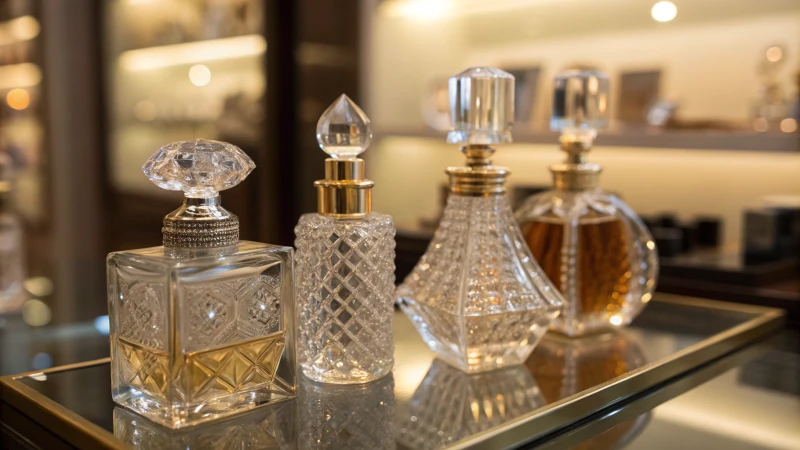
Ever held a sparkling bottle and wondered if it’s genuine crystal or just glass?
To identify crystal perfume bottles, shine a black light on them: genuine lead crystal will glow blue or purple, while regular glass will appear dull green. Additionally, crystal is heavier and more reflective, offering superior clarity and brilliance compared to glass.
The journey of distinguishing crystal from glass began for me at an antique market, clutching a seemingly ordinary bottle that caught the light in an extraordinary way. Armed with a black light—something I didn’t even know I needed until I did some research—I discovered the magical glow of genuine crystal, that unmistakable blue or purple hue under the light. What a thrill it was to realize I had found something special!
Beyond the glow, there’s the weight; crystal feels robust in hand, and its brilliance can transform even the simplest designs into art pieces. So, as you delve into your collection, remember these subtle, yet telling differences—each one a clue to uncovering true craftsmanship. As I learned more about this craft, these details became not just identifiers but stories locked within each bottle.
Crystal bottles glow blue under black light.True
Lead crystal glows blue or purple under black light, unlike glass.
Crystal is lighter than regular glass.False
Crystal is heavier than regular glass due to its lead content.
What Are the Key Differences Between Lead Crystal and Non-Lead Crystal?
Ever held a crystal glass and wondered about its sparkle? There’s a world of difference between lead and non-lead crystal, influencing not just aesthetics but health and eco-friendliness too.
Lead crystal is infused with lead oxide, offering more weight, brilliance, and ease of cutting, whereas non-lead crystal substitutes elements like barium or potassium to achieve similar clarity without the health concerns tied to lead.
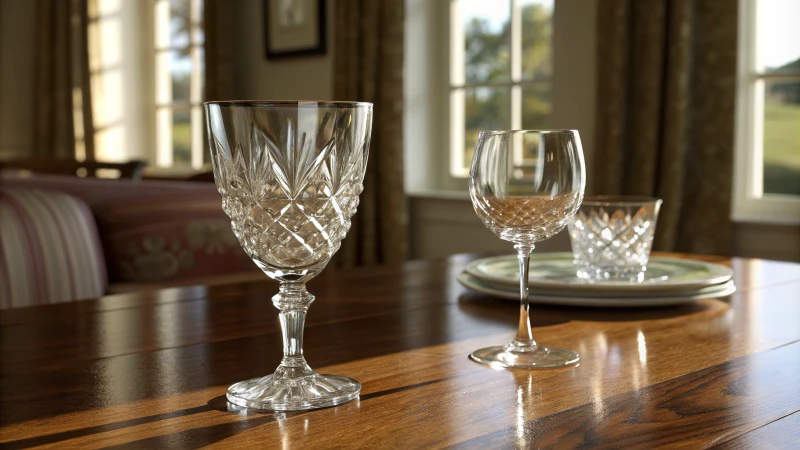
Chemical Composition and Structure
I remember the first time I held a lead crystal glass—it was at a family dinner, and I marveled at its weight and shine. Lead crystal owes its heavy, dazzling appeal to the 24% to 32% lead oxide that elevates its refractive index1. On the other hand, non-lead crystal, which I now prefer in my home for safety reasons, uses substitutes like barium or potassium oxides. These alternatives maintain clarity without compromising our health.
| Type | Key Component | Benefits |
|---|---|---|
| Lead Crystal | Lead Oxide | Higher brilliance, easy to engrave |
| Non-Lead Crystal | Barium/Potassium | Safer, eco-friendly |
Safety Concerns
Safety has always been a top priority for me, especially with kids around. Lead crystal can leach lead into acidic beverages—a risk I’m not willing to take. So, when it comes to drinkware, I opt for non-lead crystal for peace of mind. Understanding these safety issues2 is crucial for anyone making similar choices.
Aesthetic and Functional Differences
Lead crystal’s brilliance is something you can’t easily overlook—it was my grandmother’s pride at every festive gathering, thanks to its fine cuts and engravings. While non-lead crystal may not boast the same level of brilliance, its transparency and durability meet modern design needs perfectly, often featuring in eco-friendly products I love exploring.
Applications in Glassware
In my experience running a business that values both aesthetics and ethics, I’ve seen lead crystal dominate luxury items like chandeliers and fine glassware. However, non-lead crystal has been making waves in everyday tableware, aligning with my commitment to both beauty and safety standards.
Discover more about lead-free glass alternatives3 and their growing importance in today’s environmentally conscious market. It’s fascinating to see how the industry is evolving to meet new demands.
Lead crystal contains 24% to 32% lead oxide.True
Lead oxide enhances brilliance and weight, making it distinct.
Non-lead crystal is heavier than lead crystal.False
Lead oxide increases the weight of lead crystal compared to non-lead.
How does handcrafting influence the value of crystal bottles?
Have you ever held a handcrafted crystal bottle and felt the artistry whispering through its intricate designs?
Handcrafting enhances the value of crystal bottles by showcasing exceptional craftsmanship, unique details, and artistic flair. These elements elevate their aesthetic appeal, exclusivity, and luxury perception, making them highly desirable.
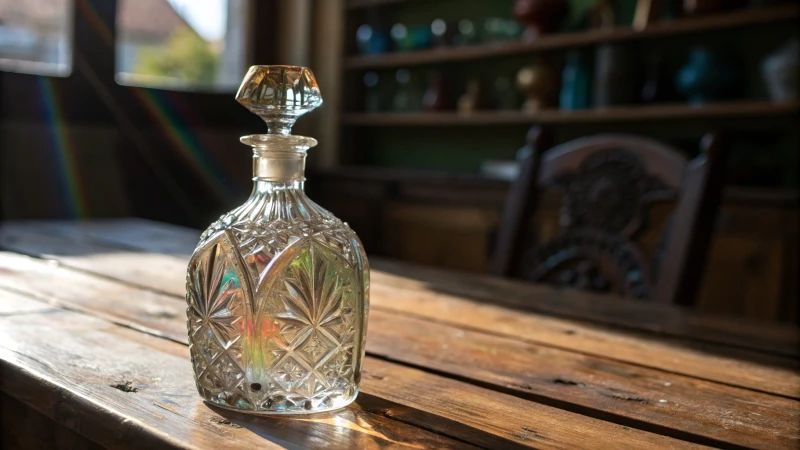
The Artistry Behind Handcrafted Crystal Bottles
When I first held a handcrafted crystal bottle, it was like holding a piece of history infused with personal artistry. Artisans, with their skilled hands, bring to life patterns and fine cutting details4 that machines simply cannot replicate. This artistry not only boosts the bottle’s visual appeal but also its intrinsic value.
Unique Characteristics and Personal Touch
Every handcrafted bottle I’ve encountered tells its own story, with distinct characteristics that make it a one-of-a-kind collector’s item. This personal touch ensures that no two bottles are identical, adding to their uniqueness and desirability.
| Feature | Handcrafted Bottles | Machine-Made Bottles |
|---|---|---|
| Detailing | Intricate and unique | Standard and uniform |
| Production Volume | Limited | Mass-produced |
| Aesthetic Appeal | High | Moderate |
Craftsmanship as a Value Driver
The true value of these bottles often comes from the fine craftsmanship5 that goes into them. Techniques such as diamond cutting and hand engraving enhance the aesthetic appeal, making them not just containers but works of art.
Emotional and Cultural Value
Beyond physical beauty, these bottles carry a weight of emotional and cultural significance. The tradition, skill, and heritage they represent often resonate deeply with consumers, who are willing to pay a premium for these attributes.
Exclusivity and Luxury Perception
In the luxury market, exclusivity is key. Handcrafted crystal bottles exude an exclusivity that machine-made versions simply can’t match. This exclusivity fuels demand among those who seek unique luxury items.
With all these elements combined, it’s clear how handcrafting elevates the perceived value of crystal bottles. They captivate collectors and luxury enthusiasts alike, not just as items to own but as pieces to treasure.
Handcrafted bottles have higher market value than machine-made ones.True
Handcrafted bottles are valued for unique artistry and limited production.
Machine-made crystal bottles offer more intricate detailing.False
Machine-made bottles have standard detailing, lacking artisan's unique touch.
How do accessories define the luxury of premium crystal bottles?
When I think about premium crystal bottles, it’s often the accessories that whisper luxury and elegance to me. How do these seemingly small details elevate the entire experience?
Accessories on premium crystal bottles, like caps and collars, don’t just add a touch of elegance—they’re telltale signs of luxury and authenticity. High-quality materials such as gold-plated metals or ceramics elevate a bottle’s stature, showcasing superior craftsmanship and genuine allure.
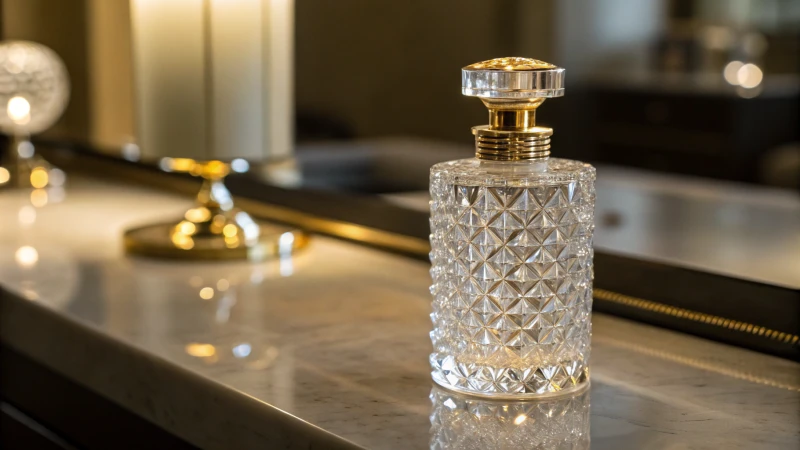
The Importance of Cap Materials
Caps are not merely about sealing the bottle; they’re about sealing the deal on luxury. When I pick up a bottle with a gold-plated or ceramic cap, it tells me, "This is something special." Such materials don’t just look pretty; they assure me of quality and authenticity, making any ordinary plastic cap pale in comparison.
| Cap Material | Impact on Perception |
|---|---|
| Gold-Plated | Luxury, Exclusivity |
| Ceramic | Quality, Authenticity |
| Plastic | Common, Low-Value |
Enhancing the Brand Image
I’ve noticed how certain brands become unforgettable just by their accessory designs. It’s like meeting someone with a distinctive fashion style—you remember them. A crystal bottle with a unique collar design6 doesn’t just stand out; it becomes synonymous with its brand, etching its identity in my mind.
Functionality Meets Design
But it’s not just about looks. Functionality plays a key role too. A well-designed stopper ensures a tighter seal, which, for me, means preserving that precious scent inside—a detail that’s paramount when I’m choosing a perfume bottle.
Craftsmanship and Attention to Detail
It’s often the intricately designed accessories that catch my eye first. They signal a level of craftsmanship that hints at the meticulous care given to the entire bottle’s creation. For me, such attention to detail is a surefire way to spot a genuine premium bottle.
In conclusion, while accessories might seem like mere embellishments, they are crucial in signaling luxury and authenticity. Whether through materials like gold-plated metals7, design, or craftsmanship, these elements collectively weave the narrative of what makes a crystal bottle truly premium.
Gold-plated caps indicate a bottle's premium status.True
Gold-plated caps are associated with luxury and exclusivity.
Plastic caps enhance the perceived value of crystal bottles.False
Plastic caps are seen as common and lower the perceived value.
How Do Market Trends Shape Your Crystal Bottle Choices?
Ever wondered how those shimmering crystal bottles on store shelves keep changing with the times?
Market trends influence your choice of crystal bottles by driving the shift towards sustainable materials, unique customizations, and innovative designs. As eco-awareness grows, lead-free and recyclable options become more popular, while customization caters to the desire for individuality.
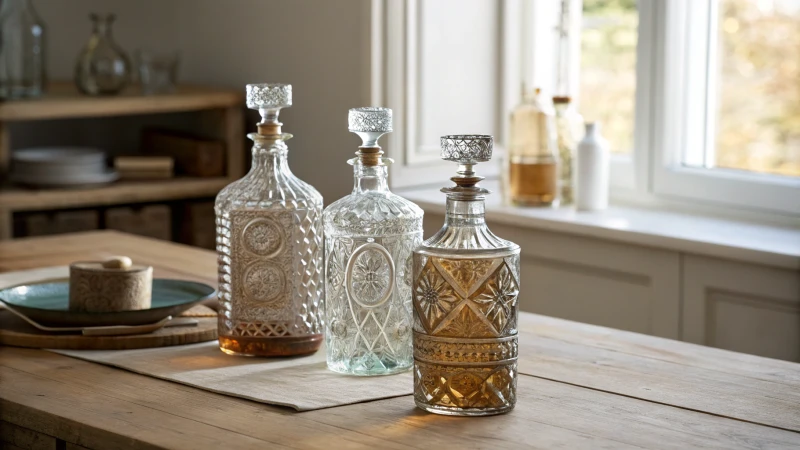
Eco-Friendly Trends in Crystal Bottles
Let me take you back to a time when I was at a local trade show, totally captivated by the stunning array of crystal bottles on display. It struck me how the shift towards eco-friendly products was more than just a buzzword—it was a full-fledged movement. Brands are now going above and beyond to meet this demand by crafting crystal bottles from lead-free and recyclable materials. This not only satisfies environmentally conscious consumers but also complies with ever-stricter regulations.
| Feature | Traditional Crystal | Eco-Friendly Options |
|---|---|---|
| Lead Content | Often includes lead | Lead-free alternatives |
| Recyclability | Limited | High |
Customization and Consumer Demand
I remember a client who was on a quest for the perfect crystal bottle that would set their brand apart. They were all about personalization, seeking something that screamed uniqueness. This is where customization trends come into play. With technologies like laser engraving and 3D printing, creating bespoke designs tailored to individual tastes has never been easier.
Customization is a growing trend in the luxury market. As consumers desire personalized products, bespoke crystal bottles are increasingly sought after. Technologies like laser engraving and 3D printing allow for unique designs that cater to individual tastes.
Impact of Global Supply Chains
Navigating global supply chains is like a dance—one wrong step, and the whole process can go awry. Companies are increasingly sourcing from developing countries to cut costs, but this comes with its own set of challenges, particularly in maintaining quality control. I’ve learned that staying on top of supply chain dynamics is crucial, especially when it comes to competitive pricing strategies8.
Global supply chains significantly influence market trends in crystal bottle production. With a shift towards sourcing from developing countries, companies can reduce costs but must ensure quality control.
Role of Technology in Design Innovations
The first time I saw a bottle designed with diamond cutting technology, I was awestruck by its brilliance and elegance. Technology has truly revolutionized how crystal bottles are crafted. These cutting-edge techniques not only enhance visual appeal but also add significant value to the product.
Advancements in technology have revolutionized the design and manufacturing of crystal bottles. Innovative techniques such as diamond cutting enhance the visual appeal and value of these bottles.
Consumer Awareness and Quality Certification
With consumers becoming savvier, there’s an increased emphasis on quality certifications. Ensuring that crystal bottles adhere to international standards is more important than ever. These certifications offer peace of mind regarding a product’s authenticity and environmental safety.
With heightened consumer awareness, there is an increased demand for quality certifications. Ensuring that crystal bottles meet international standards is crucial.
Staying informed about these market trends isn’t just about keeping up—it’s about making strategic choices that resonate with consumer expectations and meet regulatory demands.
Lead-free crystal bottles are more recyclable than traditional ones.True
Eco-friendly options focus on lead-free and recyclable materials.
Global supply chains decrease the cost of crystal bottles.True
Sourcing from developing countries helps reduce production costs.
Conclusion
Learn to identify crystal perfume bottles by checking their weight, shine under black light, and craftsmanship. Distinguish between lead and non-lead crystal for quality assurance.
-
Discover how lead oxide enhances the brilliance of lead crystal by increasing its refractive index. ↩
-
Learn why lead crystal might pose health risks and the precautions needed when using it. ↩
-
Find out about modern glass alternatives that avoid using lead while maintaining similar quality. ↩
-
Explore this link for an in-depth look at various cutting techniques used by artisans to enhance crystal bottles. ↩
-
Learn more about the intricate craftsmanship that increases the market value of handcrafted crystal bottles. ↩
-
Discover distinctive collar designs that help brands stand out in the luxury market. ↩
-
Explore why gold-plated metals are favored in luxury packaging and how they elevate product status. ↩
-
Understand how global supply chains influence the cost and pricing strategies of crystal bottles. ↩



